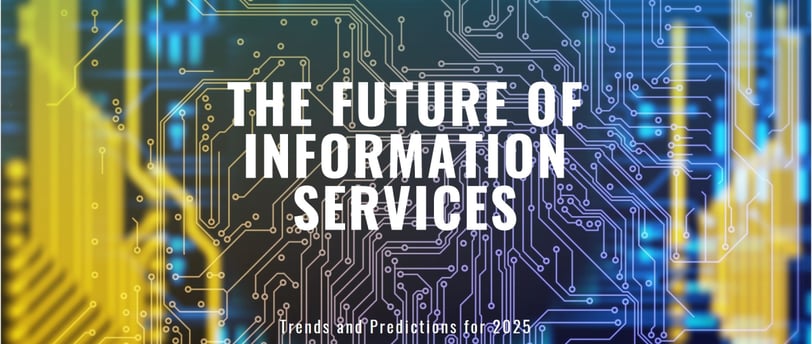The Future of Information Services: Trends and Predictions for 2025


Current Trends:
The Information Services industry is undergoing rapid transformation, driven by advancements in technology and evolving business needs. Here are some of the most significant trends shaping the sector:
Data-Driven Decision Making: Organizations increasingly rely on data analytics to make informed decisions. This trend has led to a surge in demand for advanced data processing and analysis services, enabling businesses to derive actionable insights from vast amounts of data.
Cloud Computing: Cloud services have become the backbone of modern information services. They offer scalability, flexibility, and cost-effectiveness, allowing businesses to access and manage data from anywhere. This shift has accelerated the adoption of hybrid and multi-cloud strategies.
Artificial Intelligence and Machine Learning: AI and ML are revolutionizing the industry by automating processes and providing predictive analytics. These technologies help companies optimize operations, improve customer experiences, and develop new products and services.
Cybersecurity: With the increasing volume of data and the rise in cyber threats, cybersecurity has become a top priority. Companies are investing heavily in robust security measures and compliance with data protection regulations to safeguard sensitive information.
IoT Integration: The Internet of Things (IoT) is expanding the scope of information services by connecting various devices and generating real-time data. This integration is enhancing operational efficiencies and creating new business opportunities.
Where We Are Leading To?
Looking ahead to 2025, the Information Services industry is poised for even more significant changes. Here are some predictions for the future:
Enhanced AI Capabilities: AI and ML will become more sophisticated, with improved algorithms and broader applications. Businesses will leverage these technologies for deeper insights, advanced automation, and innovative solutions, making AI a central component of information services.
Quantum Computing: Although still in its early stages, quantum computing holds the potential to revolutionize data processing. By solving complex problems much faster than traditional computers, quantum computing will open new frontiers in data analysis and cybersecurity.
Increased Data Privacy Regulations: As data breaches become more common, governments worldwide will implement stricter data privacy laws. Companies will need to adapt to these regulations, ensuring compliance while maintaining their data processing capabilities.
5G Connectivity: The rollout of 5G networks will significantly enhance data transmission speeds and connectivity. This advancement will support the growth of IoT, enabling real-time data collection and analysis on an unprecedented scale.
Sustainability and Green IT: Environmental concerns will drive the adoption of sustainable practices in the Information Services industry. Companies will focus on reducing their carbon footprint through energy-efficient data centers, eco-friendly technologies, and green IT solutions.
Personalized Services: With advancements in AI and data analytics, businesses will offer more personalized and tailored services to their customers. This trend will enhance customer satisfaction and loyalty, giving companies a competitive edge.
In conclusion, the Information Services industry is at a pivotal point, with current trends setting the stage for a transformative future. By staying ahead of these trends and preparing for upcoming changes, businesses can capitalize on new opportunities and navigate the challenges of this dynamic sector. As we move towards 2025, the industry will continue to evolve, driven by technological innovations and an ever-growing emphasis on data-driven strategies.
So, I am curious to know: 🌟
What specific trends in the Information Services industry do you think will have the most significant impact on your business in the next five years?
How is your organization currently leveraging data analytics and AI to drive business decisions and improve customer experiences?
What strategies have you implemented to enhance cybersecurity and ensure data privacy in your operations?